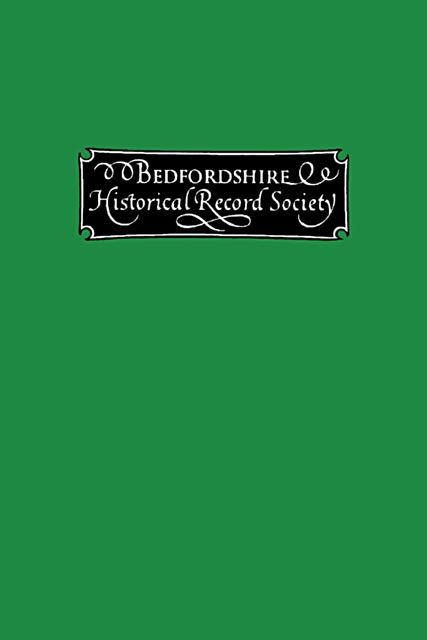Book contents
- Frontmatter
- Contents
- Abbreviations and Symbols
- The Shefford Beaker: circa 1800 B.C.
- The Morteyn Family in Bedfordshire
- The Shire of Bedford and The Earldom of Huntingdon
- The Later Descent of Wingate of Harlington
- The Disseisins by Falk de Breauté at Luton
- An Elizabethan Inquisition Concerning Bondmen
- Roll of The Justices in Eyre, 1240
- A List of Bedfordshire Apprentices: 1711 - 1720
- The Commune of Bedford
- Addendum I. “The Shire of Bedford and The Earldom of Huntingdon.”
- Addendum II. “The Disseisins of Falk de Breauté.”
- A Hand List of The Bedfordshire County Muniments : Prepared by The County Records Committee
- Index
The Shire of Bedford and The Earldom of Huntingdon
Published online by Cambridge University Press: 14 July 2023
- Frontmatter
- Contents
- Abbreviations and Symbols
- The Shefford Beaker: circa 1800 B.C.
- The Morteyn Family in Bedfordshire
- The Shire of Bedford and The Earldom of Huntingdon
- The Later Descent of Wingate of Harlington
- The Disseisins by Falk de Breauté at Luton
- An Elizabethan Inquisition Concerning Bondmen
- Roll of The Justices in Eyre, 1240
- A List of Bedfordshire Apprentices: 1711 - 1720
- The Commune of Bedford
- Addendum I. “The Shire of Bedford and The Earldom of Huntingdon.”
- Addendum II. “The Disseisins of Falk de Breauté.”
- A Hand List of The Bedfordshire County Muniments : Prepared by The County Records Committee
- Index
Summary
Both before and after the Conquest, the Earl was one of the three great administrators of Local Government in a Shire; the Sheriff was responsible for fiscal and judicial duties, the Bishop for ecclesiastical work, the Earl for military organisation; at the Shire Court, held twice yearly, these three jointly presided. The way in which the Earl was rewarded for his services has been the subject of some controversy. On the one hand, in some cases certain manors seem to have been set aside from early times for his maintenance, and are styled comital manors (villae comitales). Again, he might be granted “the third penny of the County,” that is, one-third of the fines and other moneys paid into the Shire Court, but this profit apparently did not follow necessarily on his creation as Earl. Or again he might receive “the third penny of the revenues of the Burgh,” that is, a third of the money paid by the burgesses as gafol or rent to the Crown. These apparently were the subject of separate grants, sometimes the one is mentioned explicitly, sometimes the other; but the Empress Matilda, in creating Miles of Gloucester the Earl of Hereford, granted both “the third penny of the revenue of the burgh of Hereford …. and the third penny of the pleas of the county of Hereford.” But whether the Earl received them by prescriptive right or by special grant, the fact that he received them or any of them may be taken as evidence that he enjoyed the dues of an Earl, and therefore presumably carried out an Earl's duties.
In order properly to value the charters which are pointed below, the vicissitudes of the Earldom and Honour of Huntingdon must first be traced. Immediately before the Conquest, we find Waltheof as Earl of Northants, and Hunts.; and William the Conqueror continued him in this dignity till his final rebellion in 1075. But no certain answer has been given to the question—who carried out the duties of an Earl in Bedfordshire, then or later?
Waltheof married Judith, niece of the Conqueror, who after his death held those lands which went with the Earldom, and later were always known as the Honour of Huntingdon; she seems to have died before 1090, when Simon I de St. Liz, who married her daughter Matilda, became Earl of Northants, and Hunts, in her right.
- Type
- Chapter
- Information
- Publisher: Boydell & BrewerFirst published in: 2023



